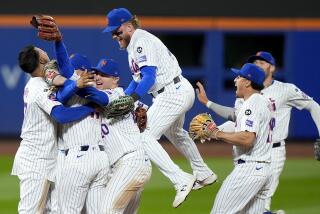Gary Carter’s Current Fight Doesn’t Involve Darryl Strawberry
- Share via
PORT ST. LUCIE, Fla. — Gary Carter was sitting around discussing the pugilistic efforts of two of his New York Mets teammates when he paused and said, “You know, I’ve never had a fight in my life, even when I was a little kid. I don’t believe in fighting.”
Carter paused, smiled that Grand Canyon smile, then said, “But, you know, my friends tell me that knowing what they know about me, if I ever did get into a fight, the other guy would probably have to kill me to stop me.”
Again came the Carter grin. Behind the smile, though, are serious thoughts about a fight Carter did not start, but one he has no choice but to wage.
It’s not a fight against a teammate, although Darryl Strawberry did shout at Carter, “You’re next,” moments after Strawberry had taken a wild swing at Keith Hernandez during, of all things, the team photo session last week.
“I didn’t hear him,” Carter said with a laugh. “If I did, I would have just waved him off. But I was too busy jumping in front of the cameras, saying, ‘Come on, guys, you don’t need to shoot this stuff.’ I heard nothing but clicks. ... I felt like I was in the Japanese embassy. It was only talk (from Strawberry). If he’d swung at me, he would have had to put me down for good, though.”
Carter, as easygoing a player as there is, laughed again. He and Strawberry are cool these days. But there is another challenge, one to be taken seriously. The fight is against what Carter calls the “twilight” nipping at what some believe to be the end of his career.
Carter is about to enter the last year of a seven-year contract. And, for the first time in his career, the not-so-young “Kid” knows a new, lucrative contract will not be an automatic. Far too many questions about diminishing skills make that impossible. Certainly, he wants to keep on playing, “and I want it to be here,” he said, gesturing toward a Mets team that has been “home” since 1985.
“I know I need to show I can still play,” Carter said. “I don’t think I necessarily need to have a 25-home run, 100-RBI season, but I need to have the kind of season I’m capable of having.”
On that the Mets agree. They look at Carter’s 1988 numbers -- .242, 11 home runs, 46 RBI -- and see a player who could not make anything come easily at the plate in 1988. They look at his age -- he will turn 35 April 8 -- and wonder if the need for a more durable catcher with a stronger arm can possibly be met by a man with so many battle scars.
Said Mets Vice President Joe McIlvaine: “Gary has to improve his offensive numbers and his throwing. That’s obvious that you would expect that of a $2 million player as opposed to a player making, say, $100,000 a year.”
For one who has enjoyed a storybook existence, this obvious challenge is new. “It’s definitely a challenge, no doubt about it,” Carter said. “I’ve had adversities before, but nothing to this extent. But I like the challenge. I’m looking forward to it.”
Carter would like to think he will be viewed in the same way as the Royals’ Bob Boone and the White Sox’ Carlton Fisk. Both are still integral parts of their teams.
Carter is younger than both. But his position still seems less secure.
American Leaguers do not run incessantly. Carter has no respite. Fisk can also “rest” occasionally as designated hitter; Carter cannot in the National League, and he resists anything that smacks of role-playing.
There’s also no place for him to move. First base, the obvious choice, is occupied by Hernandez. The irony there is that Hernandez is technically in the same boat contractually, but Carter contends the first baseman is actually in a better position.
“I think Gary might be selling himself short to think that way,” McIlvaine said. “Everyone has to remember, catchers are more in demand than ever.”
And Carter was the National League’s starting catcher in the All-Star Game last year. It really doesn’t matter who did the voting. It’s still difficult to find a catcher who has all the defensive and offensive skills teams are looking for these days.
No one in the Mets organization is close to challenging Carter. And the Mets rejected all overtures by San Diego to send highly touted minor-leaguer Sandy Alomar Jr. their way.
“Despite what everyone reads in the papers, our reports (on Alomar) do not indicate that he is Moses incarnate,” McIlvaine said.
The rejection of Alomar bought Carter one more year. But it did not buy him an extension. He must win back confidence to win a new deal.
Carter obviously cannot grow younger, so it seems unrealistic to expect him to find an extra yard on his throws. He does see room for change, though.
A notoriously hard worker, Carter barreled into last season, bulked up from weightlifting, in pursuit of his 300th home run. The eagerness almost strangled him. It took 225 at-bats to get from 299 to 300. “It humbled me a great deal,” said Carter. “Looking back, I realized that it was something I put a great deal of significance on and maybe I shouldn’t have.”
The lesson was learned. This winter, he spent more time relaxing. And this season, he vows, “I’m not going to worry about (the next contract). I’m not going to put additional pressure on myself. I’m just going to go out and have fun.”
If that does not help translate into a renewed and improved Carter, what then?
“Who knows? Maybe then it may be time to retire,” Carter said. “But I want to keep playing. I love this game. I would love to finish up in New York. I have no desire to go elsewhere. But if staying in baseball means going elsewhere, I would. I’ve always had security. Now I could be a free agent. I’ve never done that before. ... That could be exciting.”
More to Read
Go beyond the scoreboard
Get the latest on L.A.'s teams in the daily Sports Report newsletter.
You may occasionally receive promotional content from the Los Angeles Times.










